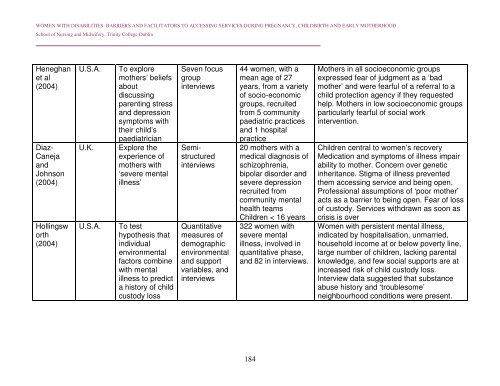Women with Disabilities: Barriers and Facilitators to Accessing ...
Women with Disabilities: Barriers and Facilitators to Accessing ...
Women with Disabilities: Barriers and Facilitators to Accessing ...
Create successful ePaper yourself
Turn your PDF publications into a flip-book with our unique Google optimized e-Paper software.
WOMEN WITH DISABILITIES: BARRIERS AND FACILITATORS TO ACCESSING SERVICES DURING PREGNANCY, CHILDBIRTH AND EARLY MOTHERHOODSchool of Nursing <strong>and</strong> Midwifery, Trinity College DublinHeneghanet al(2004)Diaz-Caneja<strong>and</strong>Johnson(2004)Hollingsworth(2004)U.S.A.U.K.U.S.A.To exploremothers’ beliefsaboutdiscussingparenting stress<strong>and</strong> depressionsymp<strong>to</strong>ms <strong>with</strong>their child’spaediatricianExplore theexperience ofmothers <strong>with</strong>‘severe mentalillness’To testhypothesis thatindividualenvironmentalfac<strong>to</strong>rs combine<strong>with</strong> mentalillness <strong>to</strong> predicta his<strong>to</strong>ry of childcus<strong>to</strong>dy lossSeven focusgroupinterviewsSemistructuredinterviewsQuantitativemeasures ofdemographicenvironmental<strong>and</strong> supportvariables, <strong>and</strong>interviews44 women, <strong>with</strong> amean age of 27years, from a varietyof socio-economicgroups, recruitedfrom 5 communitypaediatric practices<strong>and</strong> 1 hospitalpractice20 mothers <strong>with</strong> amedical diagnosis ofschizophrenia,bipolar disorder <strong>and</strong>severe depressionrecruited fromcommunity mentalhealth teamsChildren < 16 years322 women <strong>with</strong>severe mentalillness, involved inquantitative phase,<strong>and</strong> 82 in interviews.Mothers in all socioeconomic groupsexpressed fear of judgment as a ‘badmother’ <strong>and</strong> were fearful of a referral <strong>to</strong> achild protection agency if they requestedhelp. Mothers in low socioeconomic groupsparticularly fearful of social workintervention.Children central <strong>to</strong> women’s recoveryMedication <strong>and</strong> symp<strong>to</strong>ms of illness impairability <strong>to</strong> mother. Concern over geneticinheritance. Stigma of illness preventedthem accessing service <strong>and</strong> being open.Professional assumptions of ‘poor mother’acts as a barrier <strong>to</strong> being open. Fear of lossof cus<strong>to</strong>dy. Services <strong>with</strong>drawn as soon ascrisis is over<strong>Women</strong> <strong>with</strong> persistent mental illness,indicated by hospitalisation, unmarried,household income at or below poverty line,large number of children, lacking parentalknowledge, <strong>and</strong> few social supports are atincreased risk of child cus<strong>to</strong>dy loss.Interview data suggested that substanceabuse his<strong>to</strong>ry <strong>and</strong> ‘troublesome’neighbourhood conditions were present.184
















